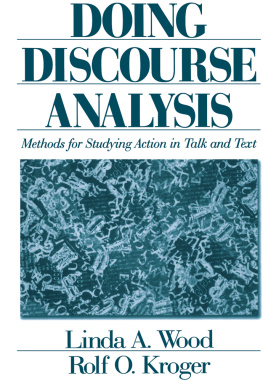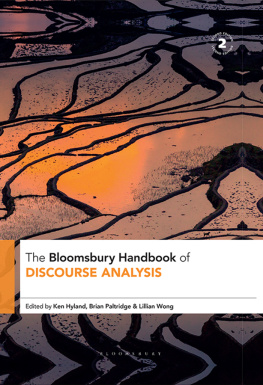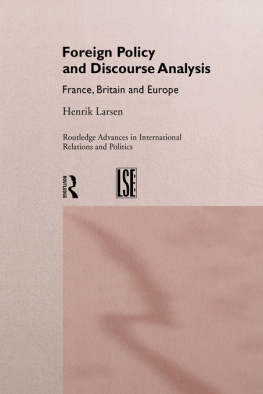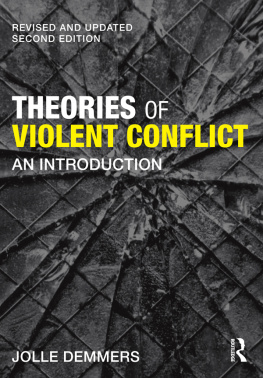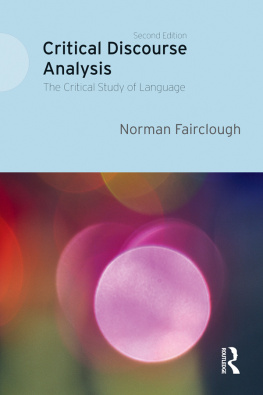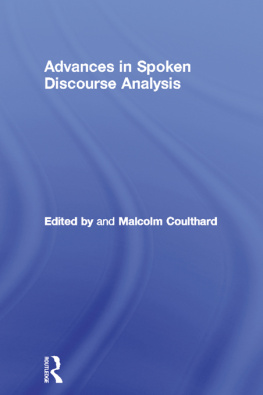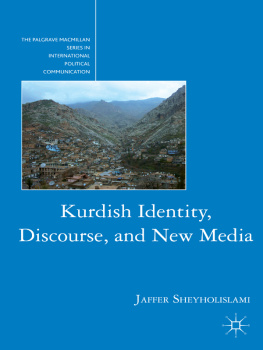MEDIA DISCOURSE AND THE YUGOSLAV CONFLICTS
Media Discourse and the Yugoslav Conflicts
Representations of Self and Other
Edited by
PL KOLST
University of Oslo, Norway
First published 2009 by Ashgate Publishing
Published 2016 by Routledge
2 Park Square, Milton Park, Abingdon, Oxon OX14 4RN
711 Third Avenue, New York, NY 10017, USA
Routledge is an imprint of the Taylor & Francis Group, an informa business
Copyright Pl Kolst 2009
Pl Kolst has asserted his moral right under the Copyright, Designs and Patents Act, 1988, to be identified as the editor of this work.
All rights reserved. No part of this book may be reprinted or reproduced or utilised in any form or by any electronic, mechanical, or other means, now known or hereafter invented, including photocopying and recording, or in any information storage or retrieval system, without permission in writing from the publishers.
Notice:
Product or corporate names may be trademarks or registered trademarks, and are used only for identification and explanation without intent to infringe.
British Library Cataloguing in Publication Data
Media discourse and the Yugoslav conflicts : representations of self and other
1. Yugoslav War, 1991-1995 - Mass media and the war
2. Yugoslav War, 1991-1995 - Press coverage 3. Yugoslav War, 1991-1995 - Propaganda 4. War in mass media 5. Mass media and propaganda - Former Yugoslav republics
I. Kolsto, Pal
949.7'03
Library of Congress Cataloging-in-Publication Data
Kolsto, Pal.
Media discourse and the Yugoslav conflicts : representations of self and other / by Pal Kolsto.
p. cm.
Includes bibliographical references and index.
ISBN 978-0-7546-7629-4 (hbk)
1. Yugoslav War, 1991-1995--Press coverage. 2. Yugoslav War, 1991-1995--Mass media and the war. 3. War in mass media. 4. Yugoslav War, 1991-1995--Motion pictures and the war. 5. Yugoslav War, 1991-1995--Literature and the war. 6. Kosovo War, 1998-1999--Mass media and the war. 7. Mass media--Moral and ethical aspects. 8. Mass media and propaganda--Former Yugoslav republics. I. Title.
DR1313.7.P73K65 2009
949.703--dc22
2008039161
ISBN 978-0-7546-7629-4 (hbk)
ISBN 978-1-3155-9447-7 (ebk-PDF)
ISBN 978-1-3170-9891-1 (ebk-ePUB)
Contents
Introduction
Discourse and Violent Conflict:
Representations of SelfOther in the Yugoslav Successor States
Pl Kolst
1 Media Discourse and the Politics of Ethnic Conflict:
The Case of Yugoslavia
Tarik Jusi
Sabina Mihelj, Veronika Bajt and Milo Pankov
3 Foreclosing the Other, Building the War:
A Comparative Analysis of Croatian and Serbian Press Discourses During the Conflict in Croatia
Ivana uri and Vladimir Zori
4 Events and Sites of Difference:
Mark-ing Self and Other in Kosovo
Nita Luci and Predrag Markovi
Jovo Baki and Gazela Pudar
6 Relations between Montenegro and Serbia from 1991 to 2006:
An Analysis of Media Discourse
ore Pavievi and Sran urovi
7 Spinning Out of Control:
Media Coverage in the Bosnian Conflict
Michal Sldeek and Amer Dihana
8 Spinning Out of Control:
Mutual Reinforcement Discourse in Macedonia?
Zhidas Daskalovski
9 The Semantics of Silence, Violence and Social Memory:
The Storm in the Croatian and Serbian Press
Gordana eri
Nedin Muti
Conclusion
Discourse and Violence
Pl Kolst
List of Figure and Table
Notes on Contributors
Veronika Bajt (b. 1973), holds a PhD in Sociology from the University of Bristol, UK. She is a researcher at the Peace Institute Institute for Contemporary Social and Political Studies, in Ljubljana, Slovenia. She is also a lecturer at the International University Institute for European Studies, IUIES, in Gorizia, Italy. Her field of research includes migrations, studies of nationalism, ethnicity and racism, and post-socialist transformations in Central-Eastern Europe, particularly former Yugoslavia.
Jovo Baki (b. 1970), MA, is a teaching assistant and a doctoral candidate at the Department of Sociology, Faculty of Philosophy, University of Belgrade. He specializes in the study of nationalism, with the focus on Yugoslavia and Yugoslavism. Bakis first book, Ideologies of Yugoslavism Between Serbian and Croatian Nationalism, 19181941 (2004) was published in Serbian. Baki is currently completing his PhD thesis, Shifts in the Interpretations of the Death of Yugoslavia.
Zhidas Daskalovski (b. 1974), holds a PhD from the Political Science Department, Central European University in Budapest. He has published a number of scholarly articles on politics in the Southeast European region, as well as co-editing the book Understanding the War in Kosovo (London: Frank Cass, 2003). Dr Daskalovski teaches at the Political Science Department at the University of Cyril and Methodius and has been engaged as a senior trainer in the capacity-building programme CRPM in public policy and EU affairs.
Ivana uri (b. 1973), PhD, is a CRCEES Postdoctoral Fellow at the Department of Russian and Slavonic Studies, University of Nottingham. Her main interests are in the area of policy studies, comparative politics, democratization, and post-conflict societies, human and minority rights in South-eastern and Eastern Europe. She has published on the Croatian Diaspora, political inclusion of the Serb minority and issues of minority refugee repatriation to Croatia. Her current research is devoted to the refugee repatriation policies facilitating minority return to Croatia, Bosnia and Kosovo.
Sran urovi (b. 1978), is a teaching assistant at the Faculty of Political Science, University of Belgrade and Director of the Centre for Applied European Studies, an independent think tank institute based in Belgrade. His academic interests are in the field of contemporary political theory and he takes special interest in issues of identity, citizenship, nationalism and Europeanization. He is co-editor of three books on the Europeanization of Serbian social, political, legal and economic space.
Amer Dihana (b. 1973), works as an analyst and head of the Mediacentar Sarajevo Research Program. He received a Masters Degree from the Faculty of Political Science of Sarajevo. Dihana is interested in the study of media operation in societies undergoing conflict. He also researches issues related to the future of public service broadcasting.
Gordana eri (b. 1968), Dr Phil., is a research fellow at the Institute for Philosophy and Social Theory, University of Belgrade. She was a lecturer at the Slavic Studies Department at Charles University of Prague and has carried out many scholarly projects. Her research focus is on identity discourses, stereotypes and mental mapping, and her numerous publications include topics like national mythology, imagology and cultural memory.
Tarik Jusi (b. 1972), PhD, works as Program Director at the Mediacentar Sarajevo and is a Visiting Research Fellow at the Centre for Media and Communication Studies, CEU Budapest (20082009). His interests lie in the field of post-conflict media interventions, media and democratization and public service broadcasting. He has recently co-edited two books,


